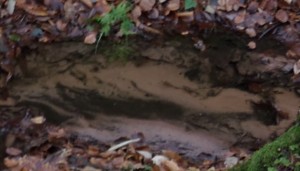In this post, Mirco Bundschuh talks about their recently published paper “An ecological and ecotoxicological perspective on fine particulate organic matter in streams”.
In former posts, we were presenting research targeting the impact of chemical stress on the quality of leaf material for primary consumers (e.g. shredder) under laboratory (see e.g. here, here, and here) but also field conditions (see here). Thereby it is assumed that a reduction in the feeding on leaves by these shredders affects the provision of fine particulate organic material (FPOM) – in the form of feces for organisms (collectors) that a depending on this material as food sources. In the present review article we critically reflect upon the scientific evidence available in literature investigating the role of FPOM in the ecosystem, its role for the nutrition of collectors and how organic and in-organic stressors impact the FPOM dynamics and properties. We identified the identity of the invertebrates producing FPOM, and the nutritional quality of their food resources as key biological factors controlling the resource quality of FPOM for collectors. Also it seems that the FPOM nutrient content is also strongly influenced by microbial colonisation and activity, and FPOM processing rates are thus likely to be sensitive to the impacts of stressors affecting microbes, that is antimicrobials (fungicides and antibiotics) and nutrients. Moreover, we identified the potential of FPOM to bind and transport hydrophobic chemicals stressors as an important vector also into the heterotrophic aquatic food web. However, knowledge on the magnitude of such effects on collectors that feed of FPOM is scarce and needs more attention. Also the bottom-up directed effects of antimicrobials along this food chain are lacking. We argue in this review that by combining concepts and research approaches from ecotoxicology and basic stream ecology the development of this research field would be facilitated by developing a common integrated framework.
The paper was authored Mirco Bundschuh and Brendan McKie and is published in Freshwater Biology.
For further reading, see also the first author’s ResearchGate page: 
You may also be interested in:
You are what you eat – continued
EU fungicide risk assessment not sufficiently protective for key drivers in leaf litter breakdown

